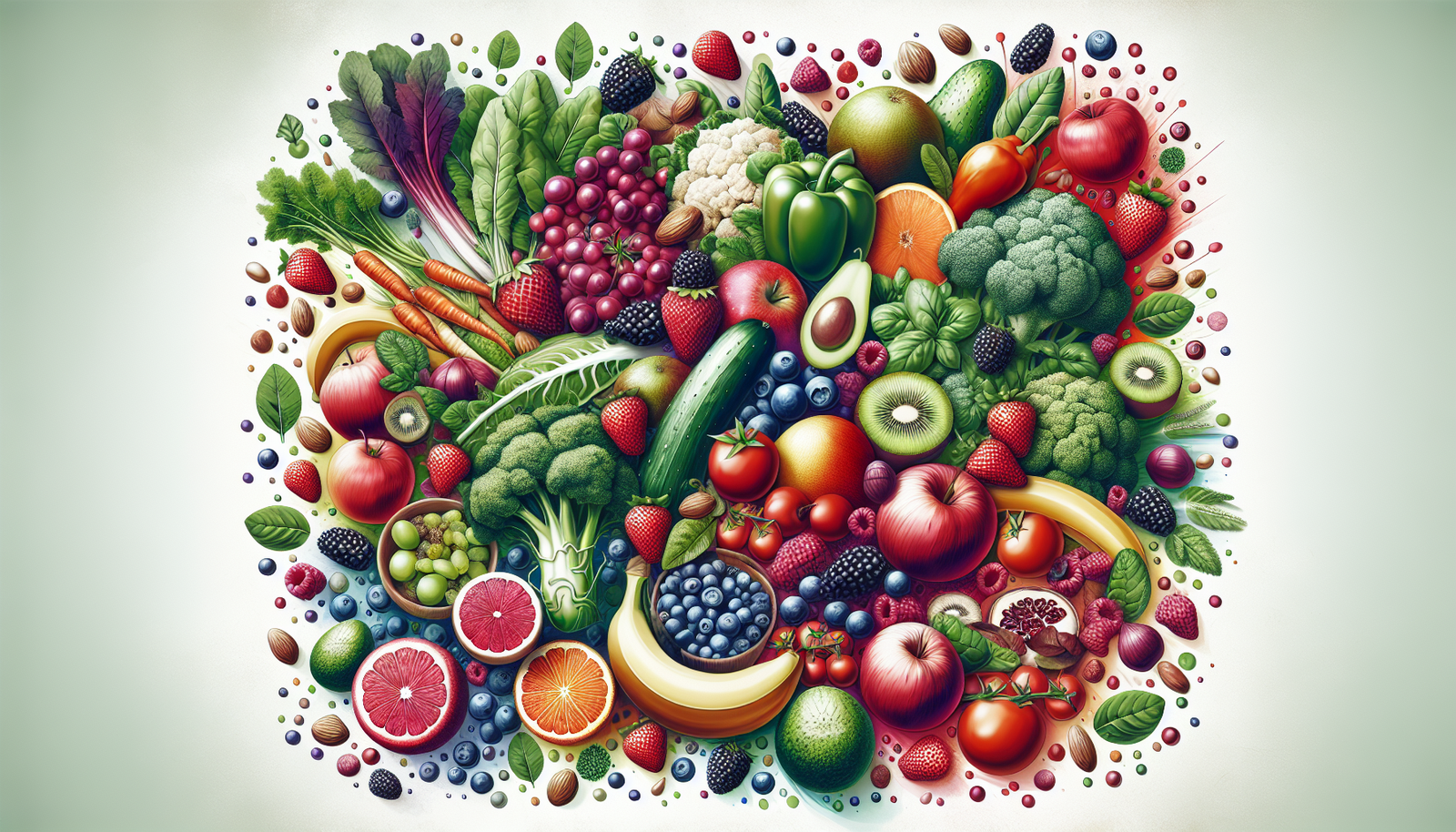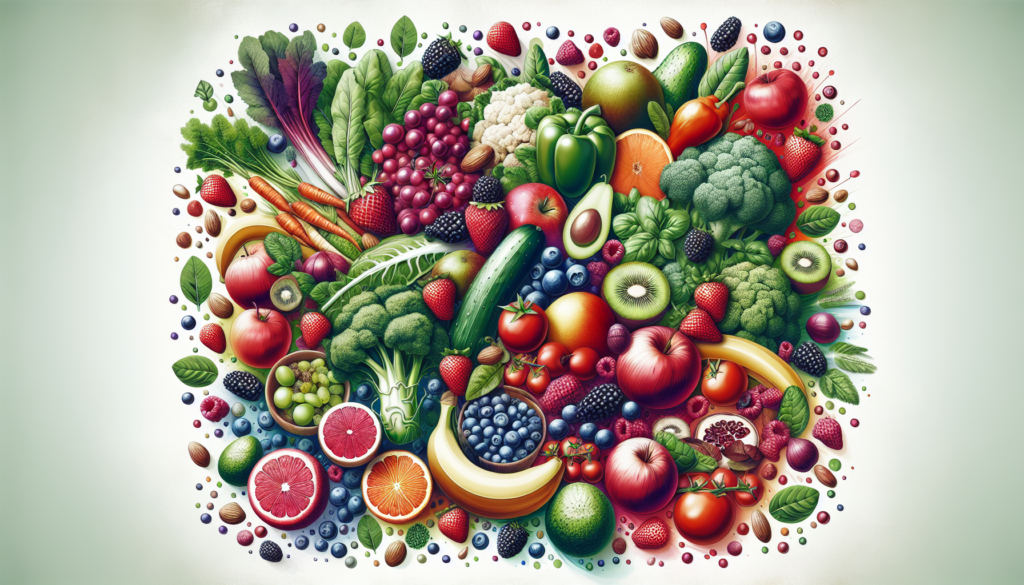
Have you ever wondered how you can enhance your overall well-being and achieve better health in a natural and holistic way? Look no further than organic superfoods. These power-packed foods are not only delicious but also loaded with essential nutrients and health-boosting properties. From everyday wellness to stress relief, organic superfoods can play a significant role in optimizing your health. Whether you’re interested in exploring plant-based supplements, incorporating herbal teas into your routine, or discovering the benefits of essential oils, this article will guide you through the world of organic nutrition and natural practices to help you lead a healthier and more mindful lifestyle. Get ready to embark on a journey of wellness, as we delve into the power of organic superfoods and their potential to transform your health. The Power of Organic Superfoods

Introduction
Organic superfoods have gained significant popularity and recognition in recent years due to their numerous health benefits and nutritional value. As people become more conscious of their well-being, they are actively seeking ways to improve their diet and incorporate organic foods into their lifestyle. In this article, we will delve into the world of organic superfoods, exploring their definition, why they are a better choice, their nutritional benefits, top superfoods and their health benefits, how to incorporate them into your diet, common myths surrounding them, their environmental impact, and even provide some delicious organic superfood recipes for optimal health.
Definition of Organic Superfoods
Before we dive into the benefits and properties of organic superfoods, let’s first understand what they actually are. Superfoods are nutrient-rich foods that are considered to be especially beneficial for health and well-being. These foods are packed with vitamins, minerals, antioxidants, and other beneficial compounds that support various bodily functions. When we talk about organic superfoods, we mean superfoods that have been grown and produced according to organic farming practices.
Organic superfoods are cultivated without the use of synthetic fertilizers, pesticides, herbicides, or genetically modified organisms (GMOs). Instead, they rely on natural methods of farming that promote soil health, biodiversity, and sustainability. This ensures that the superfoods are free from harmful chemicals and retain their natural integrity and nutritional composition.
Why Choose Organic Superfoods
While non-organic superfoods offer some health benefits, choosing organic superfoods is a wise decision for several reasons.
- Benefits of Organic Farming Practices: Organic farming practices prioritize the use of natural fertilizers, crop rotation, and biological pest control methods. By avoiding synthetic chemicals, these farming practices contribute to the preservation of soil health, protect water quality, and promote biodiversity.
- Avoiding Pesticides and Chemicals: One of the primary reasons to choose organic superfoods is to prevent the consumption of harmful pesticides and chemicals. Non-organic farming methods often rely on the use of pesticides and herbicides, which can accumulate in the body over time and have been associated with various health risks.
- Higher Nutrient Content: Organic superfoods have been found to have higher nutrient content compared to their non-organic counterparts. Studies have shown that organic crops contain more vitamins, minerals, and phytochemicals, which are natural compounds that have been linked to numerous health benefits.
- Preserving Soil Health: Organic farming practices prioritize the health of the soil by promoting natural processes and avoiding the use of synthetic chemicals. This results in soil that is rich in organic matter, microbial life, and essential nutrients, which in turn leads to healthier and more nutrient-dense superfoods.
- Supporting Sustainable Agriculture: By choosing organic superfoods, you are supporting sustainable agricultural practices that work towards the long-term preservation of our planet. Organic farming reduces the use of harmful chemicals, conserves water, and protects biodiversity, making it a more environmentally friendly choice.
Nutritional Benefits of Organic Superfoods
Organic superfoods offer a wide range of nutritional benefits that can positively impact your overall health and well-being. Let’s explore some of the key benefits:
- Rich in Antioxidants: Antioxidants are compounds that help protect our cells from damage caused by harmful free radicals. Organic superfoods, such as blueberries, kale, and goji berries, are particularly rich in antioxidants, which can help reduce the risk of chronic diseases and promote general health.
- High in Essential Vitamins and Minerals: Organic superfoods are packed with essential vitamins and minerals that are necessary for optimal bodily functions. For example, spinach is a great source of iron, while quinoa provides a good amount of protein and various B vitamins.
- Anti-inflammatory Properties: Chronic inflammation has been linked to numerous diseases, such as heart disease, diabetes, and certain types of cancer. Many organic superfoods, such as turmeric and chia seeds, possess anti-inflammatory properties that can help combat inflammation and promote better health.
- Good Source of Dietary Fiber: Fiber is important for digestive health, as it helps regulate bowel movements and promotes the growth of beneficial gut bacteria. Organic superfoods like quinoa, chia seeds, and spinach are excellent sources of dietary fiber that can support a healthy digestive system.
- Promote Heart Health: Several organic superfoods have been found to be heart-healthy. For instance, blueberries are rich in anthocyanins, which have been shown to reduce the risk of heart disease. Additionally, chia seeds are high in omega-3 fatty acids, which are beneficial for cardiovascular health.
- Boost the Immune System: Organic superfoods, such as goji berries and turmeric, are known for their immune-boosting properties. They contain vitamins, minerals, and antioxidants that help strengthen the immune system and protect against various infections and diseases.
- Support Weight Management: Many organic superfoods are low in calories and high in nutrients, making them an excellent choice for weight management. Incorporating superfoods like spinach and kale into your diet can help you feel fuller for longer and support healthy weight loss.
- Improve Digestion and Gut Health: Organic superfoods that are rich in fiber, such as chia seeds and quinoa, promote good digestion and support the growth of healthy gut bacteria. These foods can help alleviate digestive issues and improve overall gut health.
Top Organic Superfoods and Their Health Benefits
Now that we understand the nutritional benefits of organic superfoods, let’s explore some of the top superfoods and the specific health benefits they offer:
- Blueberries: Blueberries are packed with antioxidants and have been shown to improve brain function, protect against heart disease, and promote healthy aging.
- Kale: Kale is a nutrient powerhouse, rich in vitamins A, C, and K, as well as minerals like calcium and magnesium. It has anti-inflammatory properties and is beneficial for eye health.
- Quinoa: Quinoa is a complete protein source that contains all essential amino acids. It is also high in fiber and various minerals, making it a nutritious and gluten-free grain alternative.
- Chia Seeds: Chia seeds are an excellent source of omega-3 fatty acids, fiber, and antioxidants. They can help reduce inflammation, support heart health, and promote healthy digestion.
- Spinach: Spinach is a rich source of vitamins, minerals, and antioxidants. It can improve eye health, support bone health, and provide a wide range of nutrients in a low-calorie package.
- Goji Berries: Goji berries are loaded with antioxidants and have been used in traditional Chinese medicine for centuries. They are believed to boost the immune system, enhance brain function, and support healthy skin.
- Cacao: Cacao is the raw form of chocolate and is a rich source of antioxidants. It can improve mood, boost cognitive function, and support cardiovascular health.
- Seaweed: Seaweed is highly nutritious, containing vitamins, minerals, and antioxidants. It is a good source of iodine, which is essential for thyroid health, and can also support weight management.
- Turmeric: Turmeric contains an active compound called curcumin, which has powerful anti-inflammatory and antioxidant properties. It can help reduce pain, improve brain function, and support overall health.
- Açai Berries: Açai berries are known for their high antioxidant content and are beneficial for heart health, brain function, and boosting the immune system.
How to Incorporate Organic Superfoods into Your Diet
Now that you are aware of the various organic superfoods and their health benefits, you may be wondering how to include them in your daily diet. Here are some simple and delicious ways to incorporate organic superfoods:
- Smoothies and Juices: Blend your favorite superfoods with fruits, vegetables, and a liquid of your choice to create a nutrient-packed smoothie or juice. Adding chia seeds, spinach, or goji berries can boost the nutritional value.
- Salads and Bowls: Add organic superfoods like kale, quinoa, or blueberries to your salads or grain bowls for an extra nutrient kick. These can be enjoyed as a main meal or as a side dish.
- Snacks and Trail Mixes: Create your own healthy snack mix by combining nuts, seeds, and dried fruits with superfoods like goji berries or cacao nibs. These portable snacks are perfect for on-the-go nutrition.
- Superfood Powders and Supplements: If incorporating organic superfoods into your meals is challenging, you can opt for superfood powders or supplements. These can be added to smoothies, yogurt, or water for a quick and convenient nutritional boost.
- Homemade Energy Bars: Make your own energy bars using organic superfoods like chia seeds, cacao, or goji berries. These bars can serve as a healthy and satisfying snack between meals.
- Plant-based Protein Sources: Include organic superfoods such as quinoa, chia seeds, or hemp seeds in your meals to increase your protein intake. These plant-based sources are rich in essential amino acids.
- Healthy Desserts: Use organic superfoods like cacao, açai berries, or chia seeds to create guilt-free, nutrient-dense desserts. From chia seed puddings to açai bowls, the options are endless.
Common Myths about Organic Superfoods
There are several misconceptions surrounding organic superfoods. Let’s debunk some of the common myths:
- Superfoods as a Magic Cure-all: While organic superfoods offer numerous health benefits, they are not a magic cure-all. Incorporating a variety of nutrient-dense foods into a well-balanced diet is key for overall health and well-being.
- You Have to Eat Them in Large Quantities: While organic superfoods are highly nutritious, consuming them in moderation is sufficient to reap their benefits. Incorporate them into your diet in sensible portions, alongside other healthy foods.
- Expensive and Unaffordable: While it’s true that some organic superfoods can be more expensive than conventional options, there are plenty of affordable choices available. Buying in bulk, frozen, or seasonal can help make organic superfoods more budget-friendly.
- Superfoods vs. Balanced Diet: Organic superfoods should be seen as a complement to a well-balanced diet, rather than the sole focus. Including a variety of fruits, vegetables, whole grains, lean proteins, and healthy fats is essential for optimal nutrition.
- Lack of Scientific Evidence: Although scientific research on organic superfoods is ongoing, there is ample evidence to support their health benefits. Numerous studies have shown the positive impact of organic superfoods on various aspects of health and well-being.
The Environmental Impact of Organic Superfoods
In addition to their health benefits, organic superfoods also have a positive impact on the environment. Here’s how:
- Advantages of Organic Farming for the Planet: Organic farming methods prioritize sustainable practices that benefit the environment. They utilize natural methods and promote biodiversity, reducing the overall ecological footprint.
- Reduced Use of Synthetic Fertilizers and Pesticides: Organic farming avoids the use of synthetic fertilizers and pesticides, which can contaminate soil, water, and air. This preserves water quality, protects wildlife, and reduces the risk of harmful chemical exposure.
- Preserving Biodiversity: Organic farming promotes biodiversity by avoiding the use of genetically modified organisms (GMOs) and synthetic chemicals that can harm beneficial insects, birds, and plants. This preservation of biodiversity is essential for the long-term health of ecosystems.
- Mitigating Water Pollution: Organic farming practices minimize water pollution by avoiding the use of synthetic fertilizers and pesticides. This helps maintain the quality of water sources and protects aquatic life.
- Conserving Energy and Resources: Organic farming relies on natural processes and sustainable practices, such as crop rotation and composting, which reduce energy consumption and promote efficient resource use.

Tips for Buying and Storing Organic Superfoods
To get the most out of your organic superfoods, it’s essential to know how to purchase and store them properly. Here are some tips:
- Choose Fresh and Local: Whenever possible, opt for fresh organic superfoods that are locally sourced. Buying locally supports local farmers and ensures that the produce is at its peak freshness.
- Read Labels Carefully: When buying packaged organic superfoods, read the labels to ensure that they are indeed organic. Look for certifications from reputable organizations, such as the USDA Organic Seal.
- Store Properly: Organic superfoods, especially fresh produce like berries or leafy greens, should be stored properly to maintain their freshness. Follow the recommended storage guidelines for each superfood to maximize shelf life.
- Use Airtight Containers: Investing in airtight containers can help prolong the shelf life of organic superfoods. This prevents exposure to air and moisture, which can cause spoilage.
- Prioritize Seasonal and Frozen Options: Seasonal organic superfoods are not only fresher but also tend to be more affordable. Additionally, consider purchasing frozen organic superfoods, as they can be just as nutritious and are convenient to have on hand.
- Buy in Bulk: Purchasing organic superfoods in bulk can help save money and reduce packaging waste. This is particularly useful for pantry staples such as quinoa, chia seeds, or cacao powder.
- Check Expiration Dates: Organic superfoods, like any other food, have expiration dates. Check the dates before purchasing and consume them before they expire to ensure freshness and optimal nutrient content.
Organic Superfood Recipes for Optimal Health
To inspire you to incorporate more organic superfoods into your diet, here are some delicious and nutritious recipes:
- Blueberry Quinoa Salad: Combine cooked quinoa, blueberries, spinach, feta cheese, and a lemon vinaigrette for a refreshing and nutrient-packed salad.
- Kale and Avocado Smoothie: Blend kale, avocado, banana, almond milk, and a spoonful of chia seeds for a nutritious and creamy green smoothie.
- Chia Seed Pudding: Mix chia seeds with your choice of plant-based milk, sweetener, and flavors like vanilla or cocoa powder. Refrigerate overnight for a delicious and nutritious pudding.
- Spinach and Goji Berry Salad: Toss fresh spinach, goji berries, sliced almonds, and a balsamic vinaigrette for a vibrant and nutrient-rich salad.
- Cacao Energy Balls: Blend dates, cacao powder, almond butter, and a handful of nuts in a food processor. Roll into bite-sized balls for a tasty and energizing snack.
- Seaweed Salad: Combine seaweed, cucumbers, carrots, sesame oil, and soy sauce for a refreshing and nutrient-dense salad.
- Turmeric Golden Milk: Mix turmeric, ginger, cinnamon, a pinch of black pepper, and coconut milk for a soothing and antioxidant-rich golden milk.
- Açai Bowl: Blend frozen açai berries with your choice of fruits, plant-based milk, and a sweetener. Top with granola, fresh fruits, and nuts for a delicious and nutritious breakfast or snack.
Incorporating organic superfoods into your diet is a fantastic way to enhance your overall health and well-being. Whether you choose to add them to smoothies, salads, or desserts, these nutrient-packed foods can provide an array of health benefits. Remember to choose organic options whenever possible to support sustainable farming practices and reduce exposure to harmful chemicals. So go ahead, embrace the power of organic superfoods and nourish your body with nature’s finest offerings.
